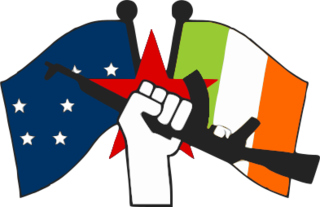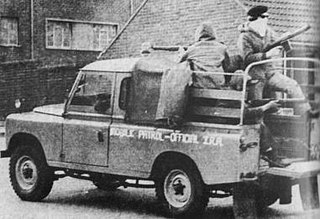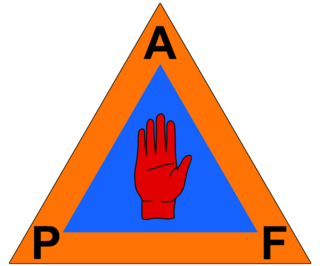Contents
- Incumbents
- Events
- Arts and literature
- Sport
- Football
- Motorcycling
- Rugby Union
- Snooker
- Births
- Full date unknown
- Deaths
- See also
- References
| |||||
| Centuries: | |||||
|---|---|---|---|---|---|
| Decades: | |||||
| See also: | |||||
Events during the year 1982 in Northern Ireland .
| |||||
| Centuries: | |||||
|---|---|---|---|---|---|
| Decades: | |||||
| See also: | |||||
Events during the year 1982 in Northern Ireland .

The Irish National Liberation Army is an Irish republican socialist paramilitary group formed on 8 December 1974, during the 30-year period of conflict known as "the Troubles". The group seeks to remove Northern Ireland from the United Kingdom and create a socialist republic encompassing all of Ireland. With membership estimated at 80–100 at their peak, it is the paramilitary wing of the Irish Republican Socialist Party (IRSP).

The Official Irish Republican Army or Official IRA was an Irish republican paramilitary group whose goal was to remove Northern Ireland from the United Kingdom and create a "workers' republic" encompassing all of Ireland. It emerged in December 1969, shortly after the beginning of the Troubles, when the Irish Republican Army (IRA) split into two factions. The other was the Provisional IRA. Each continued to call itself simply "the IRA" and rejected the other's legitimacy.

The Irish People's Liberation Organisation was a small Irish socialist republican paramilitary organisation formed in 1986 by disaffected and expelled members of the Irish National Liberation Army (INLA), whose factions coalesced in the aftermath of the supergrass trials. It developed a reputation for intra-republican and sectarian violence as well as criminality, before being forcibly disbanded by the Provisional Irish Republican Army (IRA) in 1992.

Conor Terence Murphy is an Irish republican Sinn Féin politician, who has served as Minister for the Economy of Northern Ireland since 2024. He has been a Member of the Legislative Assembly (MLA) for Newry and Armagh since 2015, having previously served as the Member of Parliament for Newry and Armagh from 2005 to 2015, observing the Sinn Fein policy of abstentionism.
During the Troubles in Northern Ireland, British security forces were accused by some of operating a "shoot-to-kill" policy, under which suspected paramilitary members were killed without an attempt being made to arrest them. This alleged policy was claimed to be most frequently directed against suspected members of Irish republican paramilitary organisations, such as the Provisional Irish Republican Army (IRA), Official Irish Republican Army (OIRA) and Irish National Liberation Army (INLA). According to a 1985 inquiry by a team of international lawyers titled Shoot to Kill?, undercover security force units were "trained to shoot to kill even where killing is not legally justifiable and where alternative tactics could and should be used." The British government, including the Northern Ireland Office, consistently denied that there was ever a "shoot-to-kill" policy, stating that "like everyone else, the security forces must obey the law and are answerable to the courts for their actions."
The Kingsmill massacre was a mass shooting that took place on 5 January 1976 near the village of Whitecross in south County Armagh, Northern Ireland. Gunmen stopped a minibus carrying eleven Protestant workmen, lined them up alongside it and shot them. Only one victim survived, despite having been shot 18 times. A Catholic man on the minibus was allowed to go free. A group calling itself the South Armagh Republican Action Force claimed responsibility. It said the shooting was retaliation for a string of attacks on Catholic civilians in the area by Loyalists, particularly the killing of six Catholics the night before. The Kingsmill massacre was the climax of a string of tit-for-tat killings in the area during the mid-1970s, and was one of the deadliest mass shootings of the Troubles.
The Droppin Well bombing or Ballykelly bombing occurred on 6 December 1982, when the Irish National Liberation Army (INLA) detonated a time bomb at a disco in Ballykelly, County Londonderry, Northern Ireland, United Kingdom. The disco, known as the Droppin Well, was targeted because it was frequented by British Army soldiers from nearby Shackleton Barracks. The bomb killed 17 people: eleven soldiers and six civilians, while dozens more were wounded. It was the deadliest attack during the INLA's paramilitary campaign and one of the deadliest bombings of The Troubles.

The Protestant Action Force (PAF) was a cover name used by Ulster loyalist paramilitary group the Ulster Volunteer Force (UVF) when claiming responsibility for a number of attacks during the Troubles in Northern Ireland. Sometimes these actions were carried out with the assistance of members of the security forces. The name "PAF" was first used in 1974 and attacks by individuals claiming to be members of the PAF killed at least 41 Catholic civilians. All of the attacks claimed by the PAF in Armagh and Tyrone counties from 1974 to 1976 have been linked to the Glenanne gang, which was a loose coalition consisting of members of the UVF Mid-Ulster Brigade along with rogue Ulster Defence Regiment (UDR) soldiers and Royal Ulster Constabulary (RUC) police officers. A six-year period of no attacks claimed by the PAF ended in 1982; during the 1980s, the PAF claimed 15 attacks in the Belfast area and two in County Armagh. UDR soldiers were convicted of two attacks in Armagh. The PAF claimed its last attacks in the early 1990s, all of which were in north Armagh and were alleged to involve members of the security forces.
Events during the year 1979 in Northern Ireland.
Events during the year 1956 in Northern Ireland.
This is a chronology of activities by the Continuity Irish Republican Army (CIRA), an Irish republican paramilitary group. The group started operations in 1994, after the Provisional Irish Republican Army began a ceasefire.
This is the Timeline of Irish National Liberation Army actions, an Irish republican socialist paramilitary group. Most of these actions took place as part of its 1975–1998 campaign during "the Troubles" in Northern Ireland. The INLA did not start claiming responsibility for its actions under the INLA name until January 1976 at which point they had already killed 12 people, before then they used the names People's Liberation Army (PLA) and People's Republican Army (PRA) to claim its attacks.
This is a timeline of actions by the Ulster Volunteer Force (UVF), an Ulster loyalist paramilitary group since 1966. It includes actions carried out by the Red Hand Commando (RHC), a group integrated into the UVF shortly after their formation in 1972. It also includes attacks claimed by the Protestant Action Force (PAF), a covername used by the UVF. Most of these actions took place during the conflict known as "the Troubles" in Northern Ireland.

From 6 to 11 July 1997 there were mass protests, fierce riots and gun battles in Irish nationalist districts of Northern Ireland. Irish nationalists/republicans, in some cases supported by the Provisional Irish Republican Army (IRA), attacked the Royal Ulster Constabulary (RUC) and British Army. The protests and violence were sparked by the decision to allow the Orange Order to march through a Catholic/nationalist neighbourhood of Portadown. Irish nationalists were outraged by the decision and by the RUC's aggressive treatment of those protesting against the march. There had been a bitter dispute over the march for many years.

The 2005 United Kingdom general election in Northern Ireland was held on 5 May 2005 and all 18 seats in Northern Ireland were contested. 1,139,993 people were eligible to vote, down 51,016 from the 2001 general election. 63.49% of eligible voters turned out, down 5.1 percentage points from the last general election.
The Derry Brigade of the Provisional Irish Republican Army (IRA) operated in the city of Derry, Northern Ireland, and its surroundings during the Troubles. The Derry Brigade was one of the most active groups in the IRA.

The Irish National Liberation Army Belfast Brigade was the main brigade area of the Irish National Liberation Army (INLA). The other Brigade areas were in Derry which was split between two battalions, the first in Derry City, and the second battalion in south County Londonderry and County Armagh which was also split into two battalions, a south Armagh and a north Armagh battalion, with smaller units in Newry, east and west County Tyrone and south County Fermanagh.
This is a timeline of actions by the Official Irish Republican Army, an Irish republican & Marxist-Leninist paramilitary group. Most of these actions took place as part of a Guerrilla campaign against the British Army & Royal Ulster Constabulary and internal Irish Republican feuds with the Provisional IRA & Irish National Liberation Army from the early 1970s - to the mid-1970s during the most violent phase of "the Troubles" in Northern Ireland.
The following is a Timeline of British Army and Royal Ulster Constabulary (RUC) undercover operations during Operation Banner during the 1969 – 1998 Northern Irish conflict in Northern Ireland that resulted in death or injury. Including operations by the SAS, 14 Intelligence Company, the Military Reaction Force (MRF), RUC Special Patrol Group and Special Branch.